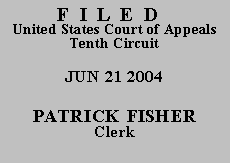

|
EDWARD BUGGAGE, |
|
Before EBEL, MURPHY, and McCONNELL, Circuit Judges.
In October, 2001, Appellant Edward Buggage filed a complaint in federal district court alleging that Appellee discriminated against him in violation of Title VII of the Civil Rights Act of 1964. Pursuant to an order of the district court, the parties participated in a settlement conference on November 1, 2002 and reached a settlement agreement which was reported to the district court on November 4, 2002. The parties thereafter entered into a Stipulation of Dismissal with Prejudice, and the district court entered an order dismissing the matter with prejudice on December 5, 2002.
On February 27, 2003, approximately three months after the district court's order dismissing the matter, Buggage sent a pro se letter to the district court wherein he petitioned the court to re-open the matter "without any repercussion due to the settlement that was mistakenly taken." Buggage's letter was referred to a United States Magistrate Judge and was treated as a motion for relief from judgment pursuant to Rule 60(b) of the Federal Rules of Civil Procedure. At a hearing on May 8, 2003, the magistrate judge heard evidence, including Buggage's testimony regarding the settlement agreement. The magistrate judge thereafter issued a Report and Recommendation recommending that Buggage's motion be denied. Specifically, the magistrate judge concluded that Buggage had failed to demonstrate entitlement to relief under any of the provisions of Rule 60(b) because he had failed to show fraud, mistake, misrepresentation, or newly discovered evidence.
On May 23, 2003, Buggage filed objections to the Report and Recommendation. The district court entered an order on May 29, 2003, adopting the Report and Recommendation but failing to consider Buggage's objections. Eighteen days later, on June 16, 2003, Buggage filed with the district court a document styled, "Motion to Reconsider Findings in Report and Recommendation." In this motion, Buggage requested the court to explain why it had not considered the objections to the Report and Recommendation he filed on May 23, 2003. On July 22, 2003, the district court denied Buggage's June 16th motion. On August 20, 2003, Buggage filed a notice of appeal from the order entered by the district court on July 22.
This court construes Buggage's June 16, 2003 motion as a motion filed pursuant to Rule 60(b) challenging the district court's failure to consider his written objections when it dismissed his first Rule 60(b) motion. Because Buggage's notice of appeal was filed within 30 days from the denial of the June 16th motion, the appeal from the denial of that Rule 60(b) motion is timely. See Smith v. Barry, 502 U.S. 244, 248-49 (1992) ("If a document filed within the time specified by Rule 4 gives the notice required by Rule 3, it is effective as a notice of appeal.")
This court reviews the denial of a Rule 60(b) motion for an abuse of discretion. Weitz v. Lovelace Health Sys., Inc., 214 F.3d 1175, 1181 (10th Cir. 2000). Buggage is correct that the district court erroneously failed to consider his written objections to the magistrate judge's Report and Recommendation. Having reviewed the entire record, including Buggage's objections, however, we hold that the court did not abuse its discretion when it denied Buggage's June 16, 2003 motion, because its July 22nd order correctly concludes that Buggage is not entitled to relief. Accordingly, we affirm the district court's order of July 22, 2003, denying the motion filed by Buggage on June 16, 2003.
ENTERED FOR THE COURT
Michael R. Murphy
Circuit Judge
*. This order and judgment is not binding precedent, except under the doctrines of law of the case, res judicata and collateral estoppel. The court generally disfavors the citation of orders and judgments; nevertheless, an order and judgment may be cited under the terms and conditions of 10th Cir. R. 36.3.